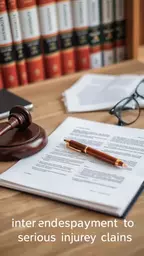Structural Repairs
Includes the roof, walls, and foundation.
Unlock your FREE 'Quick-Start Guide to No Win No Fee Claims' and demystify the legal process.
Posted on: 2025-09-15
By: Sarah Thompson
Staying informed about your rights as a tenant can drastically enhance your living experience. Knowledge empowers you to hold your landlord accountable and ensures your home remains a safe haven.
Understanding the key areas of responsibility for property repairs helps tenants advocate for their rights effectively. Below are the primary areas landlords must address, ensuring your home is always in a safe and habitable condition to avoid housing disrepair claims:
Includes the roof, walls, and foundation.
Ensuring all pipes and fixtures are in working order.
Maintaining safe wiring and electrical appliances.
Regular checks on smoke detectors and carbon monoxide alarms.
As tenants, it’s vital to understand your rights concerning your living conditions. Landlords have specific legal obligations when it comes to maintaining their properties, ensuring that they are safe and habitable. This knowledge empowers you to advocate for your rights effectively!
In the UK, these obligations are designed to protect tenants from unsafe living environments. So, let's break down what exactly these responsibilities entail and why they matter to you as a tenant.
Landlords must meet several core legal duties to ensure their properties are in good condition. Here are the primary responsibilities they hold:
Understanding these legal obligations equips tenants with the knowledge to seek necessary repairs and assert their rights. If your landlord fails to uphold these duties, it’s essential to know that you have options for recourse, potentially leading to housing disrepair compensation.
The implied warranty of habitability is a key concept in landlord-tenant law that requires landlords to keep their properties livable. This means that:
For tenants, the significance of this warranty cannot be overstated. It means you have a legal right to safe housing and that your landlord is obligated to act on repairs to uphold that standard.
Health and safety standards play a critical role in defining the responsibilities of landlords. They must comply with building codes and local regulations, ensuring that:
By enforcing these standards, landlords help to safeguard tenant well-being. If you notice any issues that violate these standards, it's crucial to report them promptly to your landlord to initiate repair processes.
When it comes to property repairs, there are specific areas where landlords hold primary responsibility. Understanding these can help you identify what to expect from your landlord:
Being aware of these key areas helps tenants know what to look for and encourages communication with landlords regarding necessary repairs.
Emergency repairs are those that, if left unattended, could pose a risk to health and safety. Examples include:
Landlords are typically legally obligated to address these issues promptly, often within 24 to 48 hours. Knowing what constitutes an emergency can help you advocate for swift action to ensure your safety!
Common disrepair issues can vary widely but often include:
Recognizing these issues as part of a landlord's responsibility allows tenants to take proactive steps in reporting them and seeking solutions.
Did you know? Keeping a detailed record of all communication with your landlord can significantly strengthen your position when seeking repairs. Include dates, times, and the nature of your requests, as this documentation can be invaluable in disputes or when escalating issues to local authorities.
A: Landlords are legally required to maintain properties in a safe and habitable condition, ensuring essential services like heating, plumbing, and electricity are functioning, and addressing repairs promptly, especially those affecting tenant safety.
A: The implied warranty of habitability is a legal principle that mandates landlords to keep their properties livable, free from significant health and safety hazards, and to make necessary repairs within a reasonable timeframe.
A: Key areas include structural repairs (roof, walls, foundation), plumbing, electrical systems, and safety measures like functional smoke detectors and carbon monoxide alarms.
A: Landlords are typically legally obligated to address emergency repairs, such as severe leaks, heating outages in freezing weather, or security issues, promptly, often within 24 to 48 hours.
A: Tenants can advocate for their rights by staying informed about legal obligations, documenting all communication with their landlord regarding repair requests, and familiarizing themselves with local tenant advocacy groups or legal aid organizations.
Understanding your rights as a tenant is crucial when it comes to addressing repair issues with your landlord. To recap, it's essential to be aware of the key obligations that your landlord has to maintain a safe and habitable living environment. This knowledge will empower you to advocate for yourself effectively, ensuring that your rights are respected. Let’s break down the crucial points regarding landlord obligations and tenant rights:
By understanding these aspects, you can navigate the complexities of landlord-tenant relationships with greater confidence!
As a tenant, taking proactive steps is vital to ensure your living conditions meet safety and habitability standards. Here are some effective ways to advocate for your rights:
When you take these steps, you empower yourself to seek the necessary repairs without fear. Remember, your living environment should reflect your right to safe housing!
For those looking to delve deeper into landlord-tenant laws, there are numerous resources available. Here are some links to valuable local legal resources and tenant advocacy groups:
These resources can provide further support, ensuring you have the tools and knowledge needed to advocate for your rights effectively. Don't hesitate to reach out for assistance, especially if you are considering proving your housing disrepair claim.
Did you know that renters' insurance can offer additional protection regarding property damage and repairs? Here’s how it can benefit you:
By considering renters' insurance, you not only safeguard your belongings but also enhance your overall confidence when dealing with repair issues. It's a wise step towards protecting your rights and interests as a tenant!
Here is a quick recap of the important points discussed in the article:



 Did you know that many tenants are unaware of their rights regarding housing disrepair? Understandin
Did you know that many tenants are unaware of their rights regarding housing disrepair? Understandin
 In today's uncertain job market, knowing your rights when it comes to termination is more crucial th
In today's uncertain job market, knowing your rights when it comes to termination is more crucial th
 In the world of serious injury claims, navigating financial challenges can be daunting. Interim paym
In the world of serious injury claims, navigating financial challenges can be daunting. Interim paym